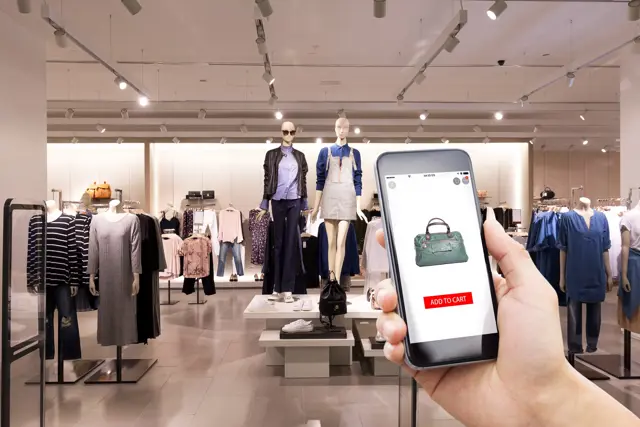Get more Retail Sector insight from HSO
Dynamics Matters Podcast Ep 67: How to create a sustainable retail future
With special guest Neil Duffy, Commercial and Services Director, Retail Trust
✔ 190 years of protecting the lives of people working in retail
✔ Why mental health was the biggest challenge during the Pandemic
✔ How technology helps support retailers
Podcast summary:
How to create a sustainable retail future?
Welcome to episode 67 of the HSO Dynamics matters podcast.
Your regular sonic dive into the world of Microsoft technology-related matters and much more besides.
I’m your host Michael Lonnon, and in this episode, I went wild down the aisles for an interview with Neil Duffy, Commercial and Services Director at the Retail Trust.
A fantastic organisation doing lots of great work supporting retail workers with their mental, financial, and social well-being.
We chatted about what they do, and how technology enables them to deliver on their vision to create hope, health, and happiness for everybody.

Transcript
Michael Lonnon
So, Neil, tell me about the Retail Trust that you work for and how it works with organisations like HSO?
Neil Duffy
The Retail Trust is a benevolent charity. We’re the oldest UK benevolent charity that’s connected to the retail industry. This year in January was our 190th birthday. We were formed in 1832, with the owners and the heads of what we would now call retail traders and drapers at the time, who recognised they needed to do a better job to look after their staff and that in return that could improve performance.
Our first chairman, Thomas Helps, claim the purpose was to promote the happiness and interests of those engaged in the trade. That is effectively our cause. We aim to create hope, health, and happiness for everybody that’s in retail, and that’s connected to retail. Whether that be frontline workers or senior leaders, whether you’re at the start of your career, we look after their health and wellbeing because we recognise that that’s the foundation that everybody needs to flourish in work and in life. So, we put people at the heart of everything that we do.
Michael Lonnon
How does that translate into people working on the front line in retail at the moment, how do they engage with the Retail Trust?
Neil Duffy
We provide many and varied support functions. From the opportunity just to have a chat with somebody on our helpline, we’ve got a 24/7 365 helpline that retail colleagues can contact us on and irrelevant of whether your problems big or small, sometimes it’s good to have a chat and share that problem. Our team is trained to be able to navigate a path for those people for the best outcome to help them with whatever their problem is. So, we look after people with emotional support, physical support, advice and guidance and financial help.
Michael Lonnon
It’s a fantastic support network for people that perhaps feel isolated in those roles.
Neil Duffy
I think what you will connect with is that a lot of people have problems and things on their mind, which has an impact on their performance. But there might not be somebody at work they’re comfortable. They don’t want to talk to their line manager about their problems, what stuff that might be going on at home or with regard to money worries. So, we act as an independent place. They can contact us confidentially, so we work on behalf of the retailers to support their people, which helps their performance or in some cases, helps get them back to work, if they might have been off in long term absence.

Is your retail business data rich but analysis poor?
In 10 minutes, this whitepaper shows you how to have only one version of the truth (data) and make the right decisions for your retail business.

Michael Lonnon
So how does the Retail Trust work with organisations like HSO?
Neil Duffy
HSO are connected with us because over the years Nicola Honey and David Little have been generously sponsoring some of our events that we’ve run for fundraising, whether those be dinners or sporting events like golf days, which has been fabulous and over the years. You have provided us advice in terms of the direction that we’re travelling with our digital and data transformation, and you’ve done pro bono work to help move us forward.
Michael Lonnon
So, you’re obviously in retail deeply, can you tell me a little bit about some of the trends that you’re seeing in the industry today?
Neil Duffy
I think what we are seeing, obviously, we’re coming out of the pandemic, in some respects getting back to normal, but we are seeing that people’s well-being is becoming a bigger issue and is critical for some people. So, although we are now out of the pandemic, officially, I think 90% of line managers are saying their staff are seeing an increase in mental health issues their teams are facing. That’s a big challenge and, unfortunately, a large proportion of those managers also say they’re feeling the burden of looking after their staff.
Michael Lonnon
One set of issues is exasperating another set of issues, further on up in the business.
Neil Duffy
That’s right. Yeah
Michael Lonnon
So, the Retail Trust, is there to support them through?
Neil Duffy
We can support them and guide them through and that might be with some short-term counselling, which we can do face to face or digitally. Or it may be if it’s financial, it might be about working out a bespoke plan, depending on everybody’s individual needs and issues.
Michael Lonnon
Okay, so you’re saying we seeing a second wave of issues coming out of COVID, which obviously, created many issues anyway, but we’re seeing a second wave which is impacting straight through into the organisation themselves. How does technology, or how can technology, or how have you seen technology, help the Retail Trust support individuals or organisations through that second wave, or even the first wave?
Neil Duffy
Over the last couple of years, we have moved at pace to raise awareness of the organisation and the work and the help that we provide, but also at changing the way that output the perception that colleagues in the industry have about us. That we’re only there when something very seriously had gone wrong and when people are on their knees and needing urgent care, and we tried to change that perception. We’ve worked hard at this to become more preventative and to provide help and advice to people at earlier stages. Now we’re seeing a trend that people are keener to investigate how they’re feeling themselves. So digital assets have become more important.
We have an online wellbeing platform built into our website, that all of the member organisations that we work with all their staff can get help advice, professional top tips, etc. They can visit that free of charge. The asset is valuable in that there’s so much content on there, over 150 different topics, hundreds of different articles, but you can get to them quickly. You can trust the information there, because one of the things that we dread is people will Google, and you can’t trust everything you read that’s out there on the internet. So, we have gone through all of our content, and it has been checked by clinical experts, and while we’ve used a combination of internal and external content, as I say, everything’s trusted.
Michael Lonnon
Has it become centralised this information, is it all kind of a central policy making it easier for people to access all this?
Neil Duffy
Absolutely. It’s a simple library with simple drop-down menus, so you can get to the subjects which are at the heart of your concerns and worries quickly and easily. They can place their own tags on articles, so that whatever the topic is that they’re interested in most the next time they visited, that’s the topic that comes straight away to the front of the of the website.
Michael Lonnon
So, there’s some intelligence behind it as well or lasting intelligence after your initial engagement.
Neil Duffy
We regularly and constantly point to our helpline, if they would like or prefer to talk to somebody, or, you know, having read, and investigated themselves, needing a little bit of extra care.
Michael Lonnon
How important has technology been in aiding assist in communication, making it easier to engage with people coming through?
Neil Duffy
I guess, like many organisations, especially when COVID hit us, we had to rethink many of our support services, and short-term counselling is one great example. Historically it had been face-to-face. The advantage was that wherever you lived in the country, we have a network of associated counsellors who can support people and could see people.
Obviously during COVID, that wasn’t possible, but the need for help was growing. So we used Microsoft Teams to do counselling sessions via teams or telephone and that’s proved really popular. It’s helped people and avoided the need for them to travel to see a counsellor. It’s streamlined the whole process and, good news for the charity from our point of view, it’s cheaper to deliver that same support in a digital format than it was a face-to-face.
Summary
For 190 years the vision of the Retail Trust has been to create hope, health, and happiness. But challenges such as the pandemic, has made this harder.
In fact it has created new problems. Management themselves suffering under the weight of increasing support for the mental well-being of others struggling back from the isolation and the dis-association of lock-down.
Technology has helped the Retail Trust. Enabling staff to expand reach and increase connection with individuals who may otherwise not have the chance to travel and meet face-to-face.
As a result, more people are being supported than ever before. It’s a great news story for the value of technology and communication.
Thanks for listening, until next time, take care of yourselves.

